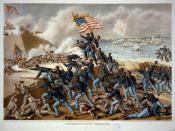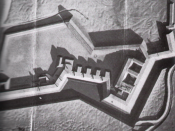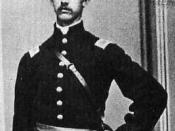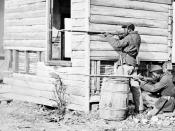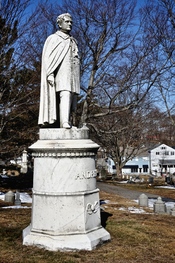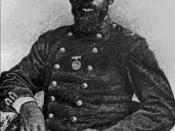Matt Pender Period 3
Research Paper 3/27/09
The history of the United States was changed forever by the events that occurred as a result of the Massachusetts 54th. The Massachusetts 54th is an all black regiment. The 54th Massachusetts Infantry was the one of the first African American Civil War regiments formed.
Time before the war was not good for African Americans. There was slavery in the south because they need people to run the machines in the mills. The north wanted to get rid of slavery and that's what started the war. John Fermont was a famous American explore of the west during the civil war. He was removed from his command for enlisting African Americans in the union army. That would later make people in the north start to enlist African Americans in the union army. Benjamin Butler took slaves from the south and helped them get to the north (The Massachusetts 54th).
Enlistees included both former slaves and free blacks from the North. The slaves from the south either ran away to go to the north, or they were free and wanted to fight for other African Americans freedom. The African Americans were not allowed in the union army. But eventually they were allowed. The Emancipation Proclamation states that all slaves in the confederate states were free. The African Americans were not aloud to sleep in the same tent as the whites. Robert Gould Shaw joined the 2nd Massachusetts Infantry as second lieutenant. He served there for over two years, seeing action at the Battle of Antietam, and was promoted to captain. And Because of his talent is commanded he was promoted He was then recruited by Governor John A. Andrew to raise and command one of the first regiments of black troops for the Union. And Because of his talent is commanded he was promoted. Robert Gould Shaw organized the troop. Massachusetts's governor John A. Andrew appointed him colonel of the 54th in February 1863. The regiment was made in March 1861 by the Governor of Massachusetts, John A. Andrew. Commanded by Colonel Robert Gould. Shaw Colonel Shaw was hand picked by Governor John Andrew. Governor Andrew also selected Norwood Penrose Hallowell as the unit's second in command.
A month later, the 54th was formed at Camp Meigs, in Readville, Massachusetts (http://afroamhistory.about.com/od/soldiers /a/54mass_infantry.htm). The Massachusetts 54th was formed because all the African Americans still wanted to join the army but there was not enough room.
In the battle at Fort Wagner there were supposed to be reinforcements but the never came. The battle on July 18 failed but gained the respect of many whites for the Massachusetts 54th. It failed because the reinforcement never showed up and the confederate states had more troops coming and the Massachusetts 54th had to retreat. Thousands of eager men wanted to join the now famous Massachusetts 54th. More states formed African Americans regiments and more white soldiers were willing to fight along side them.
The 54th Massachusetts primarily was made up of free men. A number of the recruits were from states other than Massachusetts, with several coming from Pennsylvania and New York.
Jefferson Davis' wrote the proclamation on December 23, 1862 that put both African-American enlisted men and white officers under a death sentence. The proclamation was approved, by the Confederate Congress in January 1863. The 54th left Boston to fight for the Union on May 28, 1863. They started off performing only manual labor. The regiment's first action took place in a skirmish with Confederate troops on James Island, South Carolina, on July 16. The regiment stopped a Confederate attack, losing 42 men in the process.
The regiment gained recognition on July 18, 1863, when it brought an assault on Fort Wagner near Charleston, South Carolina. They charged ahead as they were bombarded by gunfire from Confederate soldiers. The fort was heavily defended, with both cannons and sharpshooters. Nonetheless, the order came for the 54th Massachusetts to lead the way in storming the fort. They advanced through a huge storm of enemy fire. Many soldiers made it over the wall and into the fort. The vast majority, however, died in the attempt. At this battle, Colonel Shaw was killed, along with one-hundred and sixteen of his men. Another hundred and fifty-six were wounded or captured. The total casualties of 272 would be the highest total for the 54th in a single attack during the war. The Union was not able to take and hold the fort, although the 54th was widely respected as the first black regiment. The event helped encourage the African Americans to join the army and become some of the first African American troops.
After recruitment and training, the unit was sent to Hilton Head, South Carolina. Were the North had already taken over. After Shaw's death, Edward N. Hallowell from Medford, Massachusetts became the new commander.
The regiment went in other battles in Charleston during the rest of 1863. In February 1864, the regiment was assigned to help the forces in Jacksonville, Florida. From Jacksonville, they went on to the battle of Olustee where there assistance was in great need. The 54th, along with the 35th United States Colored Troops, helped the Union regiments on the front line. Though the Union forces of Brigadier General Truman Seymour and the Confederate troops of Brigadier General Joseph Finegan were evenly matched with approximately 5000 soldiers. From each side swept up in combat the four hour battle ended in a bitter defeat for the Confederate states. The Union lost more than 1800 soldiers killed, wounded, missing or captured among the highest percentage of casualties in the war a far greater loss in comparison to the Confederacy's casualties of fewer than 950 soldiers.
After the war many things had changed. For most blacks, the end of the Civil War meant a renewal of hope. The would be able to get job opportunities, they could do what they wanted, and they could even vote. Because of the war life would for ever be changes for the African Americans
Websites:
Title: History of Massachusetts 54th
URL: http://afroamhistory.about.com/od/soldiers /a/54mass_infantry.htm
Title: Fifty Fourth Massachusetts infantry
URL: http://battelofolustee.org/54th_mass-inf.htm
Books:
Author: DeAngelis, Gina
Book title: Massachusetts 54th
Publisher: Bridgestone Books
City of Publication: Mankat, Minnesota
Year of publication: 2003
Encyclopedia:
Title of Article: African American-Civil war
Title of Encyclopedia: World Book
Year of publication: 2004
Volume/Ed.:A-1
Pages used: 136g-136h
�PAGE � �PAGE �5�
